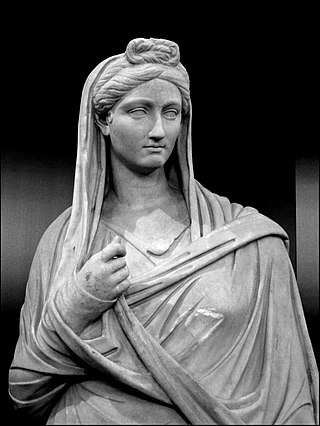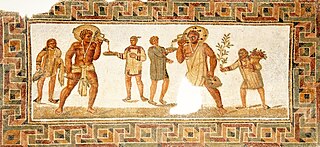Related Research Articles
Incest is human sexual activity between family members or close relatives. This typically includes sexual activity between people in consanguinity, and sometimes those related by affinity, adoption, or lineage. It is forbidden and considered immoral in most societies, and can lead to an increased risk of genetic disorders in children in case of pregnancy.

Inheritance is the practice of receiving private property, titles, debts, entitlements, privileges, rights, and obligations upon the death of an individual. The rules of inheritance differ among societies and have changed over time. Officially bequeathing private property and/or debts can be performed by a testator via will, as attested by a notary or by other lawful means.

Roman law is the legal system of ancient Rome, including the legal developments spanning over a thousand years of jurisprudence, from the Twelve Tables, to the Corpus Juris Civilis ordered by Eastern Roman emperor Justinian I. Roman law forms the basic framework for civil law, the most widely used legal system today, and the terms are sometimes used synonymously. The historical importance of Roman law is reflected by the continued use of Latin legal terminology in many legal systems influenced by it, including common law.
The pater familias, also written as paterfamilias, was the head of a Roman family. The pater familias was the oldest living male in a household, and could legally exercise autocratic authority over his extended family. The term is Latin for "father of the family" or the "owner of the family estate". The form is archaic in Latin, preserving the old genitive ending in -ās, whereas in classical Latin the normal first declension genitive singular ending was -ae. The pater familias always had to be a Roman citizen.

The Laws of the Twelve Tables was the legislation that stood at the foundation of Roman law. Formally promulgated in 449 BC, the Tables consolidated earlier traditions into an enduring set of laws.
In English common law, fee tail or entail, or tailzie in Scots law, is a form of trust, established by deed or settlement, that restricts the sale or inheritance of an estate in real property and prevents that property from being sold, devised by will, or otherwise alienated by the tenant-in-possession, and instead causes it to pass automatically, by operation of law, to an heir determined by the settlement deed. The terms fee tail and tailzie are from Medieval Latin feodum talliatum, which means "cut(-short) fee". Fee tail deeds are in contrast to "fee simple" deeds, possessors of which have an unrestricted title to the property, and are empowered to bequeath or dispose of it as they wish. Equivalent legal concepts exist or formerly existed in many other European countries and elsewhere; in Scots law tailzie was codified in an Act of 1685 which in 1896 was given a short title as an Entail Act.

Freeborn women in ancient Rome were citizens (cives), but could not vote or hold political office. Because of their limited public role, women are named less frequently than men by Roman historians. But while Roman women held no direct political power, those from wealthy or powerful families could and did exert influence through private negotiations. Exceptional women who left an undeniable mark on history include Lucretia and Claudia Quinta, whose stories took on mythic significance; fierce Republican-era women such as Cornelia, mother of the Gracchi, and Fulvia, who commanded an army and issued coins bearing her image; women of the Julio-Claudian dynasty, most prominently Livia and Agrippina the Younger, who contributed to the formation of Imperial mores; and the empress Helena, a driving force in promoting Christianity.

Citizenship in ancient Rome was a privileged political and legal status afforded to free individuals with respect to laws, property, and governance. Citizenship in Ancient Rome was complex and based upon many different laws, traditions, and cultural practices. There existed several different types of citizenship, determined by one's gender, class, and political affiliations, and the exact duties or expectations of a citizen varied throughout the history of the Roman Empire.

Thérèse Humbert was a French female fraudster, who pretended to be an heir of an imaginary American millionaire named Robert Crawford.
Nexum was a debt bondage contract in the early Roman Republic. A debtor pledged his person as collateral if he defaulted on his loan. Details as to the contract are obscure and some modern scholars dispute its existence. It was allegedly abolished either in 326 or 313 BC.

The legal rights of women refers to the social and human rights of women. One of the first women's rights declarations was the Declaration of Sentiments. The dependent position of women in early law is proved by the evidence of most ancient systems.

In Roman law, status describes a person's legal status. The individual could be a Roman citizen, unlike foreigners; or he could be free, unlike slaves; or he could have a certain position in a Roman family either as head of the family, or as a lower member.
The Lex Aelia Sentia was a law established in the Roman Empire in 4 AD. It was one of the laws that the Roman assemblies passed at the behest of the emperor Augustus. Along with the Lex Fufia Caninia of 2 BC, this law regulated the manumission of slaves.
Secessio plebis was an informal exercise of power by Rome's plebeian citizens between the 5th century BC and 3rd century BC., similar in concept to the general strike. During the secessio plebis, the plebs would abandon the city en masse in a protest emigration and leave the patrician order to themselves. Therefore, a secessio meant that all shops and workshops would shut down and commercial transactions would largely cease. This was an effective strategy in the Conflict of the Orders due to strength in numbers; plebeian citizens made up the vast majority of Rome's populace and produced most of its food and resources, while a patrician citizen was a member of the minority upper class, the equivalent of the landed gentry of later times. Authors report different numbers for how many secessions there were. M. Cary and H. H. Scullard state there were five between 494 BC and 287 BC.

Marriage in ancient Rome was a fundamental institution of society and was used by Romans primarily as a tool for interfamilial alliances. Roman marriage was a monogamous institution: Roman citizens could have only one spouse at a time but were allowed to divorce and remarry. This form of monogamy in Greco-Roman civilization may have arisen from the relative egalitarianism of democratic and republican city-states. Early Christianity embraced this ideal of monogamous marriage, and perpetuated it as an essential element in many later Western cultures.

Social class in ancient Rome was hierarchical, with multiple and overlapping social hierarchies. An individual's relative position in one might be higher or lower than in another, which complicated the social composition of Rome.

Slavery in ancient Rome played an important role in society and the economy. Unskilled or low-skill slaves labored in the fields, mines, and mills with few opportunities for advancement and little chance of freedom. Skilled and educated slaves—including artisans, chefs, domestic staff and personal attendants, entertainers, business managers, accountants and bankers, educators at all levels, secretaries and librarians, civil servants, and physicians—occupied a more privileged tier of servitude and could hope to obtain freedom through one of several well-defined paths with protections under the law. The possibility of manumission and subsequent citizenship was a distinguishing feature of Rome's system of slavery, resulting in a significant and influential number of freedpersons in Roman society.

An epikleros was an heiress in ancient Athens and other ancient Greek city states, specifically a daughter of a man who had no sons. In Sparta, they were called patrouchoi (πατροῦχοι), as they were in Gortyn. Athenian women were not allowed to hold property in their own name; in order to keep her father's property in the family, an epikleros was required to marry her father's nearest male relative. Even if a woman was already married, evidence suggests that she was required to divorce her spouse to marry that relative. Spartan women were allowed to hold property in their own right, and so Spartan heiresses were subject to less restrictive rules. Evidence from other city-states is more fragmentary, mainly coming from the city-states of Gortyn and Rhegium.
The banker of ancient times was employed within financial activities, during the ancient Mesopotamian, ancient Greek and ancient Roman periods.

In ancient Rome, contubernium was a quasi-marital relationship between two slaves or between a slave (servus) and a free citizen who was usually a former slave or the child of a former slave. A slave involved in such a relationship was called contubernalis, the basic and general meaning of which was "companion".